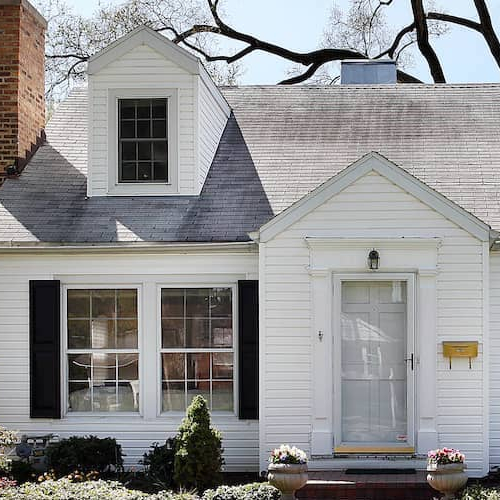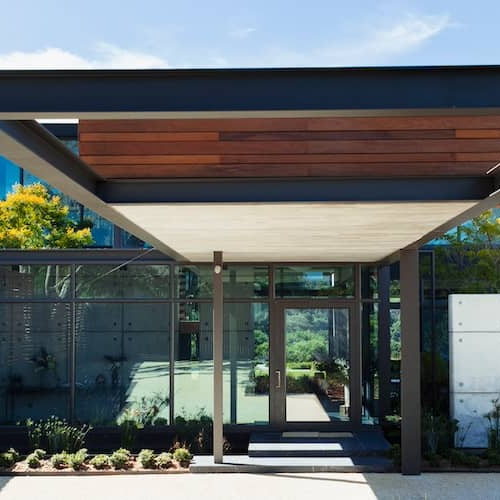Is buying a house a good investment?
Contributed by Karen Idelson, Tom McLean
May 9, 2025
•8-minute read

Owning a home isn’t just a milestone – it’s a springboard for building long-term wealth on your own terms. While the housing market has ups and downs, history shows a clear trend of home values generally rising over time. In fact, National Association of REALTORS® data reveals that, as of February 2025, the average existing-home price was 3.8% higher than a year earlier.
Still, the real question is whether purchasing a house makes sense for your long-term financial goals. Before you dive in, let’s unpack what makes a property a smart investment – everything from potential appreciation to how it fits your budget, lifestyle, and financial future.
Why buying a house is a good investment
If you’re thinking of buying a house for the first time, you’ll want to consider the potential upsides of being a homeowner. Depending on your overall financial picture, buying a house could be a step toward building equity, settling into a community you like, or reallocating money you were spending on rent toward other goals. Let’s explore some of the top reasons for buying a house.
Long-term home and equity appreciation
Historically, home values have trended upward, which significantly benefits homeowners. The average home is worth more than 23 times what it was when the Federal Reserve started tracking prices in 1963. Home prices have roughly doubled since 2009.
U.S. median sale price of homes sold from 2010 - 2023
| Year | Median year over year house price |
|---|---|
| 2010 | $221,800 |
| 2011 | $227,200 |
| 2012 | $245,200 |
| 2013 | $268,900 |
| 2014 | $288,500 |
| 2015 | $294,200 |
| 2016 | $307,800 |
| 2017 | $323,100 |
| 2018 | $326,400 |
| 2019 | $321,500 |
| 2020 | $336,900 |
| 2021 | $397,100 |
| 2022 | $457,800 |
| 2023 | $425,150 |
| 2024 | $418,975 |
While the housing market has its ups and downs with the larger economy, your house will likely grow in value over the long term. In fact, the median home sale price has dramatically increased over the last decade, going from $298,900 at the end of 2014 to $419,200 at the end of 2024. Prices are modestly lower than the peak of $442,600 at the end of 2022.
And while the value of your home rises, you’ll likely see your home equity increase further as you pay down your mortgage. If all goes well, the combination of paying your home loan and an increase in the home’s value will allow you to see a substantial return on investment when you eventually sell.
Money saved on rent
One big advantage of owning a home is that you’re not spending money on rent. You don’t build equity with rent. The funds are gone forever when you make a rent payment. If you put that money toward a mortgage, however, you’re working toward fully owning something tangible that can increase in value over time.
Rents vary widely by location and home size. Assuming a monthly cost of $1,500, a renter pays their landlord $18,000 per year. In large metro areas like Los Angeles, rent for a one-bedroom hovers around $2,655 as of 2025. In New York, it’s hit $3,960 for a one-bedroom. On the other hand, homeowners can grow their wealth as they pay off their mortgage.
This rent vs. buy calculator can help you do the math.
Greater financial stability
While renters generally don’t have to pay for surprise home repairs or replace appliances, homeowners typically have a much higher average net worth. Much of that is driven by wealth gains related to home value increases. Home equity, which is how much a home is worth after subtracting home loans, like a mortgage, can make up a significant portion of the homeowner’s net worth.
A 2024 study from the Aspen Institute found that the average homeowner's net worth is $400,000 compared to $10,400 for renters. The median home equity nationwide is $200,000, about half of the average household’s net worth.
Tax deductions
Homeowners may also benefit every year when tax season comes around. If you itemize your deductions, rather than taking the standard deduction, you may be able to deduct your home mortgage interest, which can lead to thousands of dollars in tax savings.
For example, if someone itemizes their deductions, has $10,000 in qualifying mortgage interest to deduct, and falls in the 24% tax bracket, they could potentially save $2,400 when filing their taxes.
It’s worth noting you may qualify for other homeowner tax deductions too. Property taxes are sometimes tax deductible on your federal income tax return, which can add up fast in high tax areas.
Lifestyle benefits
Like financial benefits, lifestyle benefits can help make buying a home a good investment. For example, homeowners typically have more square footage than renters, and the extra space may be helpful when raising a family or running a home business. The median square footage for new U.S. homes at the end of 2024 was 2,579 square feet, and the median square footage for apartments was 927 square feet.
Additionally, when you rent an apartment or a home, you have limited options for decorating or making changes. Most landlords won’t allow tenants to paint the walls or add solar panels. But when you own your home, you have control over those decisions and can take steps to potentially increase your home’s value.
Why you might not think of a house as a good investment
For many people, buying a home can lead to peace of mind and a sense of financial security. But that doesn’t mean everyone who buys a home is making a wise investment. Let’s look at a few reasons buying a home might not make sense for your finances.
Short-term ownership may not build enough equity
If you only live in the home for a short period of time, you may not build enough equity or see enough appreciation to cover transaction costs and walk away with a profit. It’ll typically take five to 10 years to break even.
When you plan to stay somewhere for a shorter time, renting may be a better financial decision.
Your lifestyle priorities
Many people would prefer the convenience of renting over the commitment of home ownership. As a renter, you don’t have to worry about maintenance or repairs. It’s also much easier to pack up and move when your lease ends than going through the work to list and sell a house.
Individuals and families wanting the option for more mobility could prefer renting regardless of potential investment returns.
Ongoing costs of home maintenance
Maintaining a home can be expensive because of the regular maintenance costs you’ll have to deal with, not to mention the occasional large expense for a bigger repair. On average, you can expect to pay around 1% to 4% of your home’s total value on routine maintenance every year.
So, if you own a $250,000 home, you can expect to spend at least $2,500 – $10,000 a year on costs related to various forms of maintenance, such as:
- Mowing and treating your lawn
- Cleaning out vents
- Clearing your rain gutters
- Having appliances serviced
- Paying for pest control measures
- Pool maintenance
Each of these costs will increase over time, as costs of labor and materials increase. Keep in mind that these costs are for general maintenance only and don’t include the costs of major home repairs, like replacing your roof.
You prefer urban living where renting is easier
In many urban areas, houses are rarely available, if they exist at all. In Manhattan, for example, you’re not going to find many standalone houses at all, and the cost of purchasing a townhouse or home in a multiunit building can be cost prohibitive.
If you want to live in a downtown or other urban area, you may find renting to be much easier and more affordable. You can review local listings for rental homes and homes listed for sale to better understand the market and which option may be best for your preferences and budget.
Why location matters
When you invest in a home, you aren’t just purchasing the structure you plan to live in – you’re also investing in the plot of land beneath it. While you could alter the size or condition of your house, you generally can’t change the location. It’s important to keep this in mind when purchasing a home.
| Region | Median price |
|---|---|
| Northeast | $494,000 |
| Midwest | $414,500 |
| South | $296,000 |
| West | $120,000 |
| United States (Overall) |
$414,500 |
*Based on February 2025 Census Bureau Report
Of course, every area is unique. You’ll likely find certain neighborhoods more expensive than others. Comparing different cities and rural areas will also give you a wide range of property values.
When choosing a location to buy your home, you should also consider its proximity to local communities, the size of your plot of land, and the level of development of the city. These are among a long list of factors that affect the value of homes and appreciation.
Should you buy a home?
Buying a house can be a good investment for several reasons, but that doesn’t necessarily mean doing so is the right move for you. When considering whether you should buy a home, carefully review your finances, as well as the pros and cons of homeownership mentioned in this article. Then, you can confidently make the right decision for your unique financial situation and lifestyle goals.
FAQs about investing in a house
Still trying to decide whether buying a house is a good investment for you? Take a look at some of the most frequently asked questions on the whether a house is a good investment.
Is buying a house worth it?
Buying a house is worth it if you’re financially stable, looking for a place to live and want to build equity for the long term. However, it’s often a good idea to spend time researching your housing options and saving for a down payment before you purchase a home.
Is owning a house a good investment?
Owning a home is a good long-term investment. When you rent, your money goes to your landlord, whereas you can see a return on your investment over time when you own a home.
Is buying a house a tax write-off?
If you itemize your deductions, you may be able to deduct property tax payments, mortgage interest, home office expenses, and other eligible expenses when filing your taxes. Many of these deductions are only available if you itemize deductions on your tax return.
Is buying a second house a good investment?
Buying a second home can be a good investment if it allows you to regularly return to a favorite vacation spot without having to arrange and pay for a hotel or rental home. A second home can also be a good investment if you can rent it out and collect more in rent than it costs to maintain the property. And, since home values can appreciate over time, your second home has the potential to increase your wealth significantly.
The bottom line
When your finances are steady and your life plans point toward putting down roots, buying a home can do more than give you a place to live – it can add fuel to your financial future. A fixed-rate mortgage lets you convert rent payments into equity, unlock homeowner tax advantages, and watch your property investment grow.
Transparency matters, though. Up-front closing fees, ongoing repairs, and unexpected maintenance can chip away at returns if you’re unprepared. Get your cash reserves in order, run the numbers with a critical eye, and choose a property that supports–not strains–your long-term goals. With the right foundation, homeownership becomes a powerful lever for building wealth and stability on your terms.
If you’ve weighed the pros and cons and believe you’re ready to buy a home, connect with Rocket MortgageⓇ today so we can help you navigate the home loan process. You can take the first step toward investing in a home by starting your mortgage application online.

Eric Rosenberg
Eric Rosenberg, is a financial writer, speaker, and consultant based in Ventura, California. He holds an undergraduate finance degree, an MBA in finance, and is a Certified Financial Education Instructor (CFEI®). He is an expert in banking, credit cards, investing, cryptocurrency, insurance, real estate, business finance, and financial fraud and security.
He has professional experience as a bank manager and nearly a decade in corporate finance and accounting. His work has appeared in many online publications, including USA Today, Forbes, Time, Business Insider, Nerdwallet, Investopedia, and U.S. News & World Report.
Related resources

5-minute read
Buying a flipped house: What you need to know
Watching experts flip a house is exciting, but would you want to actually move in? Learn what to look for before buying a flipped property.
Read more

6-minute read
Should I pay off debt or save for a house?
Are you wondering if it’s better for you to pay off debt or save for a house first? Read this article for some key factors to consider before moving fo...
Read more

7-minute read
Should you buy a car or house first?
Buying a car before buying a house? Discover how this decision could impact your finances, credit, and home-buying options.
Read more